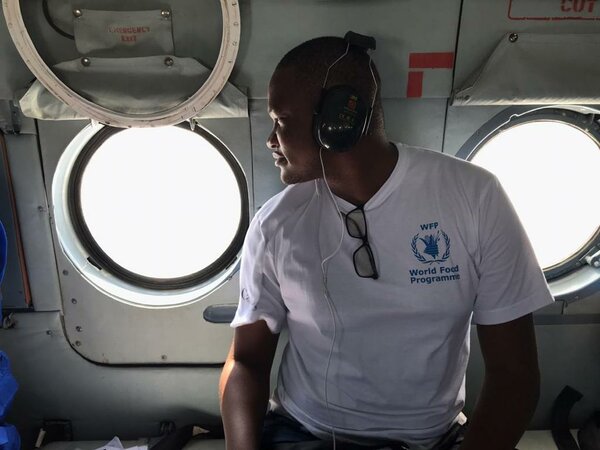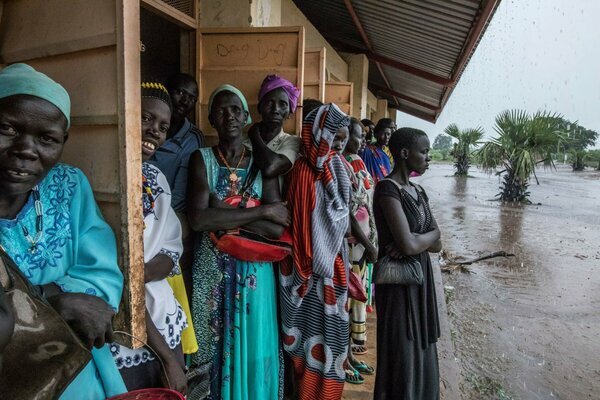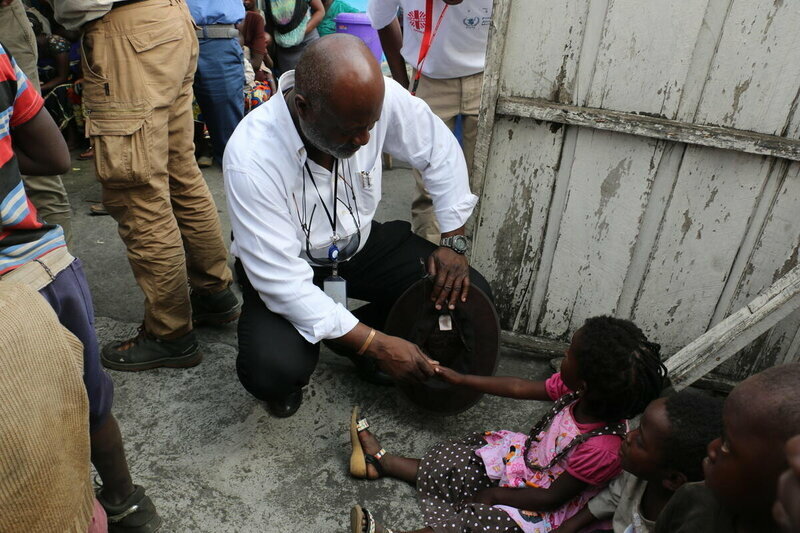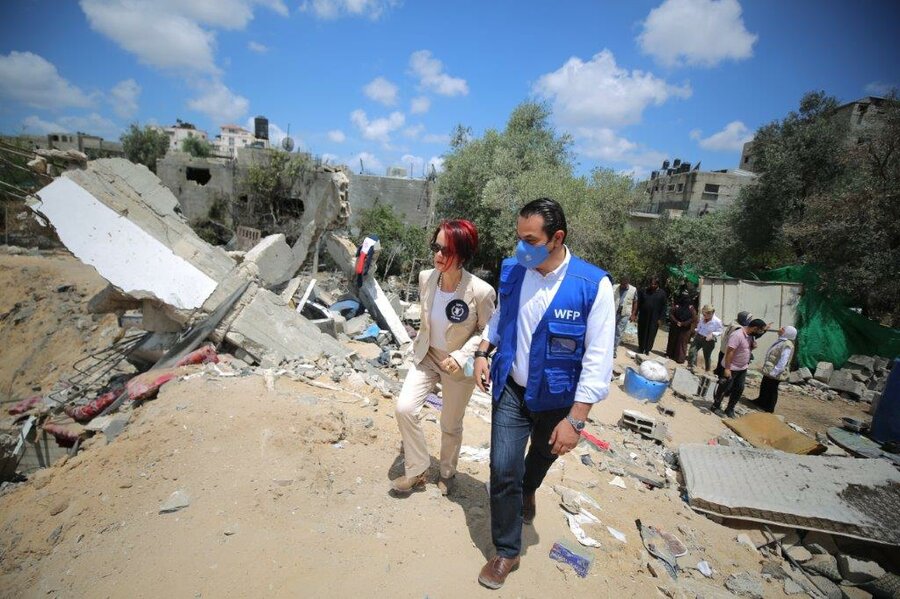WFP: supporting those who need us – whoever and wherever they may be
Story updated on 5 May 2023
Humanity, neutrality, impartiality, independence: these are the fundamental principles that guide humanitarian action, making sure that life-saving assistance reaches those who need it, regardless of their nationality, race, gender, religious belief, class, political opinions, status or location.

We asked four World Food Programme (WFP) veterans to explain what following these principles means when responding to complex emergency situations.
Humanity
Human suffering must be addressed wherever it is found. The purpose of humanitarian action is to protect life and health and ensure respect for human beings.
Tomson Phiri – Regional Communications Officer for Southern Africa


It’s 2019 and Christmas is around the corner. I am in South Sudan. The rainy season is wetter and longer than usual. Rains wipe out people's homes. Whole towns and villages lie submerged by the rising waters, amid growing concerns of possible disease outbreaks and starvation.
Five million people are hungry. The number is forecast to increase by another million – and even that may be conservative.
The Government declares a state of emergency – the highest level of alert in the country. Charities and aid agencies prepare to help. Our staff shelve what Christmas plans they had made. They grab their gum boots, raincoats and gear. We deploy Amphibian All-Terrain Vehicles, boats, choppers and pirogues. Within two days, we start distributing emergency food supplies.
Achol Mabior, a single mother of five, is one of the many displaced. Now destitute after losing her belongings, she seeks shelter in impromptu homes. “My home is gone, the village school collapsed, my silos swept away. With crops and livestock destroyed, my future was uncertain. But I am happy you have given me food and I can recover it all,” she says.
This is where humanity lies – in the way we treat people in their darkest hour.
Many of the people WFP serves are fleeing conflict, often forced to abandon their land, homes and jobs. In most cases, those affected by conflict, drought, floods, earthquakes, hurricanes, crop failures, epidemics such as Ebola or pandemics like COVID-19, have no one but humanitarian agencies to turn to. WFP's ability to respond in their hour of need is often the difference between life and death. And that’s humanity!
Neutrality
Humanitarian actors must not take sides in hostilities or engage in controversies of a political, racial, religious or ideological nature.
Annalisa Conte – Former Director, WFP Geneva Global Office

When I worked in Kenya, we delivered food assistance to all refugees irrespective of their nationality, religion, gender or age. We made sure their entitlement was properly delivered and nobody’s safety was put at risk during and after the distribution of food assistance. Maintaining neutrality is a humanitarian imperative for WFP to help all those who need it.
Neutrality is a critical principle in our work, and it is particularly important in situations of civil unrest or armed conflict. In such situations, trust is necessary to ensure all affected populations receive adequate humanitarian assistance in a safe and dignified manner. Not taking sides in any way is essential to earn that trust.
What does this mean for WFP? As enshrined in the UN Charter, WFP treats all people, in particular those it serves, as equally deserving of humanitarian assistance – irrespective of their age, gender and origin, or whether they are refugees, displaced or local communities. The only exception is active combatants, who WFP does not provide assistance to.
In contexts of high security risk, in line with the United Nations’ security management system, WFP makes use of armed escorts. This is a necessary compromise to deliver vital food assistance to people living in high-risk areas. In places like Syria, Yemen or the Democratic Republic of the Congo, WFP delivers food to all those who need it because of conflict, whether they are displaced or not and regardless of which forces are in control of the area where they live. Without WFP’s support, these people would struggle to feed themselves and their families.
Impartiality
Humanitarian action must be carried out on the basis of need alone, giving priority to the most urgent cases of distress and making no distinctions on the basis of nationality, race, gender, religious belief, class or political opinions.
Claude Jibidar – Former Country Director, WFP Chad

From my very first days with WFP as a food monitor in South Sudan, I retained one lesson: distributing food is probably one of the most difficult jobs. When it comes to food, particularly in areas where large parts of the population are hungry, everybody feels they are in need, regardless of the recommendations of our assessments.
However, at WFP we always seek to reach the furthest behind first. We see every single person as equal and deliver life-saving assistance based solely on need. This is what I would define as the humanitarian principle of “impartiality”.
On the ground, it is not always easy to be impartial. For example, in war-torn areas we strive to reach all people in need, regardless of the side of the conflict they are on. And we shall do everything in our power to deliver food to those most in distress, without discriminating by ethnic origin, nationality, political opinion, gender, race or religion.
Sometimes there can be pressures for WFP to take sides “for or against” one of the parties to a conflict. This is when we need to take the firmest stand to reaffirm our impartiality. There have been times when this was very problematic and it still is in a few places, but the notion of “impartial” humanitarian assistance has gained space and understanding. People who have blamed WFP for assisting the opposite side have also realized we are there for them when they need it.
Without this solid notion of “impartiality”, our work in the field would be much more difficult. WFP also advocates strongly for donor countries to support humanitarian assistance solely on the basis of needs. This is how we operate where our assistance is required – be it in a forgotten crisis, after a natural disaster or in protracted war situations. Our donors know that we make no distinction when providing assistance, because it is exclusively human suffering that we are trying to address.
Independence
Humanitarian action must be autonomous from the political, economic, military or other objectives that any actor may hold with regard to areas where humanitarian action is being implemented.
Samer Abdel Jaber, Country Director, WFP Palestine

Humanitarian support is separate from political, economic, military or any other objectives. That’s why independence is one of the four principles that are fundamental to humanitarian action.
What does this actually mean on the ground? For WFP and the people we serve, it means that no matter what else is happening in any country – political, military or otherwise – vital humanitarian operations are run independently of any other consideration.
Food is a basic right. Our independence helps us have unhindered access even in complex, polarized contexts or conflict situations, so we can bring food support wherever it is needed and ensure that assistance is distributed impartially, based exclusively on need.
In almost 20 years with WFP, I have had the honour of serving many WFP field operations, including Iraq, Sudan, Syria, Libya and Palestine. In all of these countries, and everywhere else WFP is present, the principle of independence is key to ensuring we can have safe, regular access to reach those we need to reach.
Help WFP support families in need, wherever they may be. Donate now.
